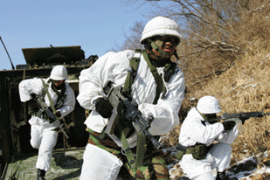S Korea hardens stance on North
South Korea said it will join UN criticism of North Korea’s human rights record.

Since 2003, South Korea has only once voted for a UN resolution on human rights conditions in North Korea, after Pyongyang‘s surprise nuclear test in October 2006.
Nuclear issue
In another sign that Seoul is getting tougher with the North, the Lee administration said on Wednesday that Pyongyang must scrap its nuclear weapon drive to secure better relations and long-term economic aid.
Kim Ha-Joong, South Korea‘s unification minister, said Seoul would no longer hesitate to raise the nuclear issue in talks with Pyongyang.
Kim acknowledged there had been criticism of past South Korean governments for making too many concessions to the North for the sake of reconciliation.
“Now the ministry is going to change with a new resolution and attitude,” South Korea‘s Yonhap news service quoted Kim as saying.
Aid will continue
Kim, however, reiterated that humanitarian aid to the North, which faces a severe food shortage, would continue regardless of nuclear progress.
 |
|
Hill and president Lee talked in January about |
The unification minister also called on Pyongyang to resolve lingering problems over South Korean prisoners of war, abductees and separated families.
Seoul says 485 South Koreans, mostly fishermen, were seized in the Cold War decades following the 1950-1953 Korean conflict and more than 500 prisoners of war were never sent home in 1953.
South Korea has previously been reluctant to make a major issue of the kidnappings.
North Korea denies holding any South Koreans against their will.
The US is also putting pressure on North Korea to comply with its promise to abandon nuclear weapon development under a six-party agreement.
Under the accord, North Korea has agreed to scrap all of its nuclear programs in exchange for economic and diplomatic benefits.
Talks bogged down
Six-party talks, however, have been bogged down by Pyongyang‘s failure to produce a declaration of those programmes by the end of last year.
The six-party agreement was hammered out among the two Koreas, China, Japan, Russia and the US,
Christopher Hill, the US‘ top envoy to North Korea, warned on Tuesday that the next few weeks will be critical in pushing forward stalled nuclear negotiations.
The assistant secretary of state indicated that internal politics in Pyongyang are providing obstacles to the nuclear talks.
“And so I think it is fair to say that there are people in North Korea who really are not with the program here, really rather continue to be producing this plutonium or whatever reason,” he said.
Hill, however, said the US would pursue with the difficult nuclear negotiations, which began in 2003.
“Clearly from out vantage point, our interests are better served by staying in the process,” he said. “We have to continue to work with the North Koreans.”